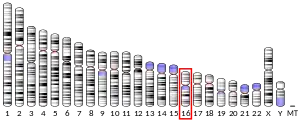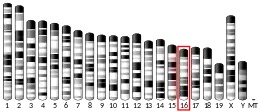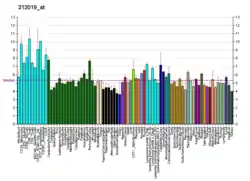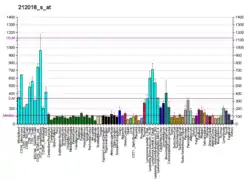RSL1D1
Ribosomal L1 domain-containing protein 1 is a protein that in humans is encoded by the RSL1D1 gene.[5][6][7]
References
- GRCh38: Ensembl release 89: ENSG00000171490 - Ensembl, May 2017
- GRCm38: Ensembl release 89: ENSMUSG00000005846 - Ensembl, May 2017
- "Human PubMed Reference:". National Center for Biotechnology Information, U.S. National Library of Medicine.
- "Mouse PubMed Reference:". National Center for Biotechnology Information, U.S. National Library of Medicine.
- Petroziello J, Yamane A, Westendorf L, Thompson M, McDonagh C, Cerveny C, Law CL, Wahl A, Carter P (Oct 2004). "Suppression subtractive hybridization and expression profiling identifies a unique set of genes overexpressed in non-small-cell lung cancer". Oncogene. 23 (46): 7734–45. doi:10.1038/sj.onc.1207921. PMID 15334068.
- Huch G, Hohn HP, Denker HW (Mar 1999). "Identification of differentially expressed genes in human trophoblast cells by differential-display RT-PCR". Placenta. 19 (8): 557–67. doi:10.1016/S0143-4004(98)90015-7. PMID 9859858.
- "Entrez Gene: RSL1D1 ribosomal L1 domain containing 1".
Further reading
- Andersen JS, Lyon CE, Fox AH, et al. (2002). "Directed proteomic analysis of the human nucleolus". Curr. Biol. 12 (1): 1–11. doi:10.1016/S0960-9822(01)00650-9. PMID 11790298. S2CID 14132033.
- Scherl A, Couté Y, Déon C, et al. (2003). "Functional Proteomic Analysis of Human Nucleolus". Mol. Biol. Cell. 13 (11): 4100–9. doi:10.1091/mbc.E02-05-0271. PMC 133617. PMID 12429849.
- Strausberg RL, Feingold EA, Grouse LH, et al. (2003). "Generation and initial analysis of more than 15,000 full-length human and mouse cDNA sequences". Proc. Natl. Acad. Sci. U.S.A. 99 (26): 16899–903. doi:10.1073/pnas.242603899. PMC 139241. PMID 12477932.
- Cai Y, Jin J, Tomomori-Sato C, et al. (2003). "Identification of new subunits of the multiprotein mammalian TRRAP/TIP60-containing histone acetyltransferase complex". J. Biol. Chem. 278 (44): 42733–6. doi:10.1074/jbc.C300389200. PMID 12963728.
- Beausoleil SA, Jedrychowski M, Schwartz D, et al. (2004). "Large-scale characterization of HeLa cell nuclear phosphoproteins". Proc. Natl. Acad. Sci. U.S.A. 101 (33): 12130–5. doi:10.1073/pnas.0404720101. PMC 514446. PMID 15302935.
- Gerhard DS, Wagner L, Feingold EA, et al. (2004). "The Status, Quality, and Expansion of the NIH Full-Length cDNA Project: The Mammalian Gene Collection (MGC)". Genome Res. 14 (10B): 2121–7. doi:10.1101/gr.2596504. PMC 528928. PMID 15489334.
- Andersen JS, Lam YW, Leung AK, et al. (2005). "Nucleolar proteome dynamics". Nature. 433 (7021): 77–83. doi:10.1038/nature03207. PMID 15635413. S2CID 4344740.
- Tong C, Tan L, Li P, Zhu YS (2005). "Identification of a novel nucleus protein involved in the regulation of urokinase in 95D cells". Acta Biochim. Biophys. Sin. (Shanghai). 37 (5): 303–9. doi:10.1111/j.1745-7270.2005.00041.x. PMID 15880258.
- Kim JE, Tannenbaum SR, White FM (2005). "Global phosphoproteome of HT-29 human colon adenocarcinoma cells". J. Proteome Res. 4 (4): 1339–46. doi:10.1021/pr050048h. PMID 16083285.
- Nousiainen M, Silljé HH, Sauer G, et al. (2006). "Phosphoproteome analysis of the human mitotic spindle". Proc. Natl. Acad. Sci. U.S.A. 103 (14): 5391–6. doi:10.1073/pnas.0507066103. PMC 1459365. PMID 16565220.
- Beausoleil SA, Villén J, Gerber SA, et al. (2006). "A probability-based approach for high-throughput protein phosphorylation analysis and site localization". Nat. Biotechnol. 24 (10): 1285–92. doi:10.1038/nbt1240. PMID 16964243. S2CID 14294292.
- Olsen JV, Blagoev B, Gnad F, et al. (2006). "Global, in vivo, and site-specific phosphorylation dynamics in signaling networks". Cell. 127 (3): 635–48. doi:10.1016/j.cell.2006.09.026. PMID 17081983. S2CID 7827573.
- Ewing RM, Chu P, Elisma F, et al. (2007). "Large-scale mapping of human protein–protein interactions by mass spectrometry". Mol. Syst. Biol. 3 (1): 89. doi:10.1038/msb4100134. PMC 1847948. PMID 17353931.
This article is issued from Wikipedia. The text is licensed under Creative Commons - Attribution - Sharealike. Additional terms may apply for the media files.





